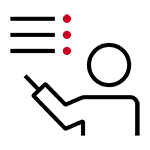
Systems can only perform well if all their components and subsystems interact effectively. Because electrical and electronic (E/E) systems often encompass components and parts developed in diverse geographical locations by multiple suppliers and integrated by engineers with a range of specializations, executing their complex development processes requires a holistic, structured approach.
Systems engineering integrates multiple disciplines of product development in the establishment and implementation of effective engineering processes, methods and tools. Strategic systems thinking can help companies save time and costs while developing competitive, reliable products.
Our systems engineering services
We offer systems engineering services to support organizations in diverse industries, including automotive, transportation, defense, aerospace, agriculture and medical devices. By taking a multidisciplinary, integrated approach, we help our customers to develop complex systems that are safer, more secure and more sustainable.
We have deep familiarity with the norms, standards and regulations that apply to software-based systems in diverse industries. We can help you navigate compliance requirements of applicable standards, including the following:
- ISO 15288, Systems and Software Engineering — System Life Cycle Processes, a systems engineering standard covering processes and stages of the product life cycle.
- IEC 61508, Functional Safety of Electrical/Electronic/Programmable Electronic Safety-Related Systems, an international standard that defines how to apply, design, deploy and maintain safety-related systems.
- ISO 26262, Road Vehicles — Functional Safety, an international standard for functional safety of E/E systems installed in road vehicles in serial production.
- ISO 14971, Medical Devices — Application of Risk Management to Medical Devices, an international standard specifying terminology, principles and processes for the risk management of medical devices, including software as a medical device and in vitro diagnostic medical devices.
- Capability Maturity Model Integration (CMMI) framework from the Information Systems Audit and Control Association (ISACA), a flexible, accessible and adaptable set of best practices for evaluating and improve business performance.
- Automotive SPICE®, the process reference model (PRM) and process assessment model (PAM) defined by the automotive industry, based on the ISO/IEC 330xx family of standards.
- ISO 13485, an international standard specifying requirements for the quality management system (QMS) of companies involved in designing, producing, installing, servicing and manufacturing medical devices.
Systems engineering training
UL Solutions Software Intensive Systems offer a variety of trainings, workshops and other learning opportunities to educate and prepare project managers, architects, designers, developers, testers and other professionals looking for an integrated approach to software, hardware, mechanics, back-end systems and other domains. We can also train personnel how to use the proper tools, methodologies and techniques of systems engineering.
Related trainings

Systems engineering consulting
We can support your organization in managing projects and developing and integrating effective processes, models and tools, including the following:
Processes and models
- Scrum
- Scaled Agile (SAFe)
- Large-Scale Scrum (LeSS)
- Kanban
- V-model
Tools
- Git
- Jenkins
- GitLab
- Bitbucket
- Eclipse
- Visual Studio Code
- Azure DevOps (formerly known as Team Foundation Server (TFS) and Visual Studio Team System
- Jira
- Confluence
- Enterprise Architect
- Cameo Systems Modeler
- IBM Jazz
- Polarion
- Jama
- PTC Integrity
- TestBench
- Codebeamer
Systems engineering applications, capabilities and knowledge areas
Systems engineering applies to diverse industries and encompasses many disciplines. We integrate the following disciplines into our systems thinking approach to supporting E/E development across the medical device, automotive, aerospace industries and beyond.
Requirements engineering
Requirements engineering is a fundamental aspect of systems engineering because system requirements are the foundation of all further development activities. We can support you in navigating the complex challenges of both classical and agile workflows in requirements engineering for products, components and systems in diverse regulated industries.
System architecture and system design
System architecture provides the structure of E/E systems’ elements and the interactions among them. This structure helps steer development decisions to achieve the system’s intended functionality and fulfill system and software quality requirements.
Model-based systems engineering
Model-based systems engineering (MBSE) is a formal model covering system requirements, design, analysis, verification and validation activities from the conceptual design phase through development and later phases of the product life cycle. In this technical systems engineering approach, a set of models, rather than documents, are the primary means of information exchange.
Process definitions
We can help customers define, visualize and simplify processes and map them to relevant standards — such as ISO ISO26262, ISO 21434 and Automotive SPICE® — using Stages process management software.
An integrated approach to addressing systems engineering needs
As an end-to-end provider, we take a holistic approach to assisting you with your systems engineering needs, integrating aspects relevant to multiple disciplines, including:
Get connected with our team
Contact us to learn more about our systems engineering services and get started.





